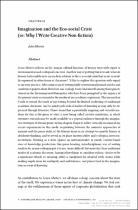| dc.contributor.author | Martin, Julia | |
| dc.date.accessioned | 2023-03-13T07:58:12Z | |
| dc.date.available | 2023-03-13T07:58:12Z | |
| dc.date.issued | 2020 | |
| dc.identifier.citation | Martin, J. (2020). Chapter 12 imagination and the eco-social crisis (or: why I write creative non-fiction). in M. Löschnigg. M. Braunecker (Eds). Green Matters: Ecocultural Functions of Literature. Netherlands: Brill. https://doi.org/10.1163/9789004408876_013 | en_US |
| dc.identifier.isbn | 9789004408876 | |
| dc.identifier.uri | https://doi.org/10.1163/9789004408876_013 | |
| dc.identifier.uri | http://hdl.handle.net/10566/8576 | |
| dc.description.abstract | Green Matters reflects on the ‘unique cultural function’ of literary texts with regard to
environmental and ecological concerns. Another way of putting this is to ask: what do
literary texts enable us to say or do in relation to the eco-social crisis that is not so readily
expressed in other forms of discourse? I’d like to explore this question with regard
to my own practice. After some years of writing fairly conventional journal articles and
conference papers about literature and ecology, I now find myself among those practitioners
in the Environmental Humanities who have been prompted by the urgency of
the present crisis to reconsider the modes of our academic expression. This means that
I wish to extend the reach of my writing beyond the limited readership of traditional
academic discourse, and to admit such radical modes of knowing as may only be expressed
through literature. | en_US |
| dc.language.iso | en | en_US |
| dc.publisher | Brill | en_US |
| dc.subject | Culture | en_US |
| dc.subject | Non-fiction | en_US |
| dc.subject | Environmental Humanities | en_US |
| dc.subject | Academics | en_US |
| dc.subject | Creative writing | en_US |
| dc.title | Chapter 12 imagination and the eco-social crisis (or: why I write creative non-fiction) | en_US |
| dc.type | Book chapter | en_US |

